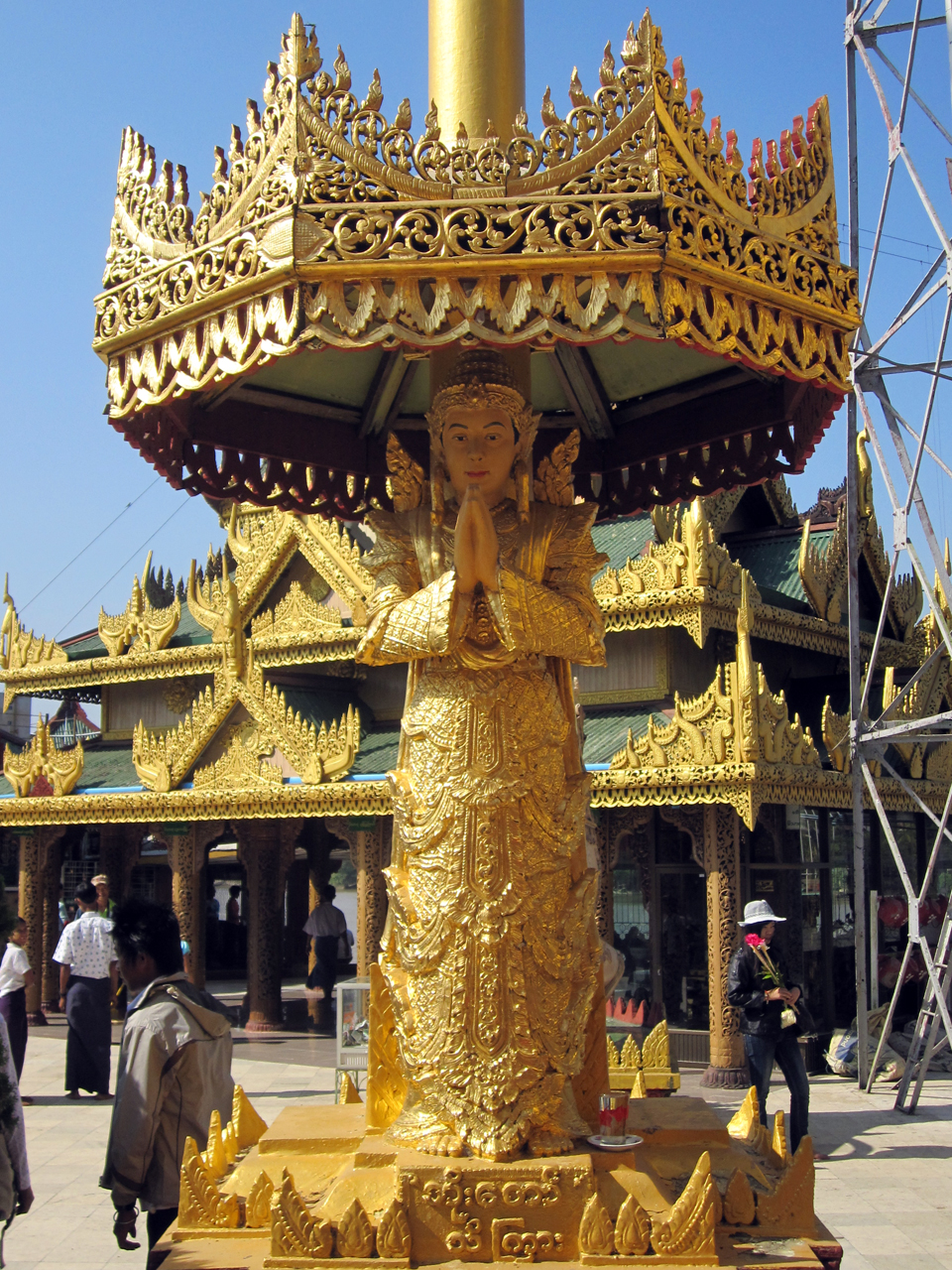Thagyamin at Shwedagon Pagoda.jpg on:
[Wikipedia]
[Google]
[Amazon]
 Thagyamin ( my, သိကြားမင်း, ; from Sanskrit ''Śakra'') is the highest-ranking
Thagyamin ( my, သိကြားမင်း, ; from Sanskrit ''Śakra'') is the highest-ranking
''U Magha'' () derived from his preexistential name.
File:Thagyamin.png, A portrayal of the King of gods, Thagyamin
File:Thagyamin Nat.jpg
File:Thagyamin at Shwedagon Pagoda.jpg, Thagyamin at the Shwedagon Pagoda
nat
Nat or NAT may refer to:
Computing
* Network address translation (NAT), in computer networking
Organizations
* National Actors Theatre, New York City, U.S.
* National AIDS trust, a British charity
* National Archives of Thailand
* National As ...
(deity) in traditional Burmese Buddhist belief. Considered as the king of Heaven, he is the Burmese adaptation of the Hindu deity Indra
Indra (; Sanskrit: इन्द्र) is the king of the devas (god-like deities) and Svarga (heaven) in Hindu mythology. He is associated with the sky, lightning, weather, thunder, storms, rains, river flows, and war. volumes/ref> I ...
.
Etymology
Thagyamin () is derived from the combination of the Sanskrit word " Shakra" (शक्र; a synonym ofIndra
Indra (; Sanskrit: इन्द्र) is the king of the devas (god-like deities) and Svarga (heaven) in Hindu mythology. He is associated with the sky, lightning, weather, thunder, storms, rains, river flows, and war. volumes/ref> I ...
) and the Burmese
Burmese may refer to:
* Something of, from, or related to Myanmar, a country in Southeast Asia
* Burmese people
* Burmese language
* Burmese alphabet
* Burmese cuisine
* Burmese culture
Animals
* Burmese cat
* Burmese chicken
* Burmese (hor ...
word "Min" (; a common title meaning Lord/King). He is also known by his nickname Description
Thagyamin is often portrayed as holding a conch shell in one hand, and a yak-tail fly-whisk in the other, and seated or standing atop a three-headed white elephant ( Airavata). He is described as the ruler of the celestial kingdom Trāyastriṃśa (). He was designated as the supreme deity of the official pantheon of 37 ''ahtet nat'' (အထက်နတ်, upper deities) by King Anawrahta in the 11th century, in an effort to streamline animist andHindu
Hindus (; ) are people who religiously adhere to Hinduism.Jeffery D. Long (2007), A Vision for Hinduism, IB Tauris, , pages 35–37 Historically, the term has also been used as a geographical, cultural, and later religious identifier for ...
practices among the populace and merge these practices with Theravada Buddhism. He is the only nat in the official pantheon not to have undergone a sudden and violent death, called a "raw" death (အစိမ်းသေ).
According to Burmese traditional folklore, every year at the first day of Thingyan
Thingyan (, ; Arakanese: ; from Sanskrit '' saṁkrānti,'' which means "transit f the Sun from Pisces to Aries) is the Burmese New Year Festival that usually occurs in middle of April. Thingyan is the first ever water festival celebrated in ...
(the Burmese new year), Thagyamin visits the earth while being invisible. There, he observes every person: he records the names of good people in a golden book, and writes the names of evildoers in a book made of dog-skin leather. On the third day of Thingyan, he returns to heaven.
Gallery
See also
Counterparts of Thagyamin in other Asian cultures * Amenominakanushi, the Japanese counterpart * Haneullim, the Korean counterpart of Yuanshi Tianzun *Indra
Indra (; Sanskrit: इन्द्र) is the king of the devas (god-like deities) and Svarga (heaven) in Hindu mythology. He is associated with the sky, lightning, weather, thunder, storms, rains, river flows, and war. volumes/ref> I ...
, the Hindu
Hindus (; ) are people who religiously adhere to Hinduism.Jeffery D. Long (2007), A Vision for Hinduism, IB Tauris, , pages 35–37 Historically, the term has also been used as a geographical, cultural, and later religious identifier for ...
counterpart
* Jade Emperor
The Jade Emperor or Yudi ( or , ') in Chinese culture, traditional religions and myth is one of the representations of the first god ( '). In Daoist theology he is the assistant of Yuanshi Tianzun, who is one of the Three Pure Ones, the three ...
, the Chinese counterpart
* Śakra (Buddhism), Śakra, the Buddhist counterpart
* Tengri, the Mongolian mythology, Mongolian counterpart
* Yuanshi Tianzun, the Taoism, Taoist counterpart
References